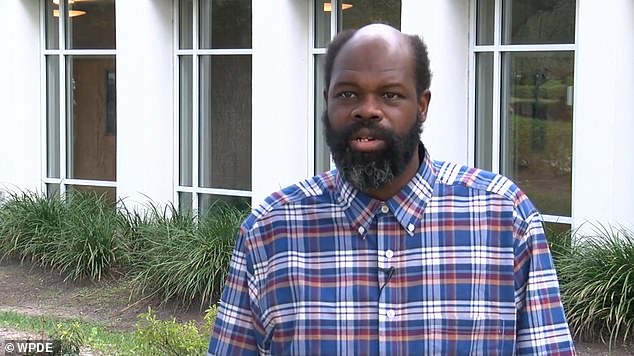

Bobby Paul Edwards, Conway, South Carolina restaurant manager at J&J Cafeteria ordered to pay enslaved black man, John Christopher Smith, $546,000 during 5 years of effective captivity at restaurant.
Disposable and discarded until one day, thirty four years after starting his work of misery and effective capture, someone paid attention….
A South Carolina restaurant boss who enslaved a disabled black employee from 2009 to 2014 has been ordered to pay his victim double the $273,000 fine previously set. The restaurant worker had worked for the establishment since 1990, first beginning at age 12.
An appeals court ruled last month that Bobby Paul Edwards, who ran the J&J Cafeteria in Conway, South Carolina, should now pay John Christopher Smith, 43, $546,000 in withheld wages and damages.
The fourth circuit judge who upped the restitution amount ruled that the fine levied on Edwards as part of a 2019 plea deal which also saw him jailed for 10 years was insufficient.
The judge argued in court documents that the original amount only included unpaid minimum wages and overtime compensation, but did not include ‘an additional equal amount as liquidated damages,’ as required under the Fair Labor Standards Act which doubles the amount repaid to victims like Smith who have been exploited by their employers.
Imprisoned in small room for five years working 100 hours a week with no pay
In its 2019 decision, the district court concluded that making Edwards, now 56, pay the extra $273,000 would be ‘statutory punitive damages’ that were only available in civil cases.
The government then appealed that decision, and the appellate court is now sending its ruling back to the district court to recalculate Smith’s award.
If the district court rules that Edwards has to pay the ‘equal amount in liquidated damages,’ he would owe Smith, now 43, a total of $546,000 for the five years he kept him imprisoned in a small room and refused to pay him for his work according to The Post and Courier.
Smith started washing dishes and busing tables at the Conway restaurant when he was just 12-years-old in 1990. After just a few years, the court documents say, Smith dropped out of high school and started working at the restaurant full-time.
He was happy with his employment at the restaurant, according to court documents, until Edwards took over the business from his brother in 2009.
At that point, Edwards moved Smith into a roach-infested apartment he owned, which Smith described in an ABC 15 interview as little more than an office with a bed in it.
He refused to let Smith see his family, threatened to have him arrested and called him racial slurs, according to court documents.

‘I couldn’t see anyone’
‘I couldn’t go anywhere. I couldn’t see my family, so that was that,’ Smith said in the ABC interview in 2015. ‘That’s the basic thing I wanted to see was my mom come see me.’
‘I couldn’t see my mom,’ he continued, ‘and I couldn’t talk to nobody.’
It remains unclear how Edwards was able to keep Smith separated from his family for so long.
Edwards also used physical violence, threats and intimidation to coerce Smith, who has mild delayed cognitive development, into working more than 18-hour days during the week and 11 hours on Sundays.
He told Smith, who had an IQ of 70, that his earnings were being kept in a bank account, but he was never given access to it.
‘I felt like I was in prison,’ Smith said in court documents. ‘Most of the time I felt unsafe, like Bobby could kill me if he wanted.’

Where was the victim’s family?
‘I wanted to get out of there so bad, but couldn’t think about how I could without being hurt.’
The court documents allege Smith had been whipped with belts and kitchen pans and punched multiple times.
In one instance, Edwards allegedly thought Smith did not deliver fried chicken to the buffet as quickly as he demanded, and dipped metal tongs into hot grease, which he then pressed into Smith’s neck.
Smith claimed in the interview with ABC 15 that Edwards’ family knew about the abuse, but did nothing to stop it.
‘They knew,’ he said. ‘All of ’em knew. They knew what he was doing.’
‘I think he’s racist,’ Smith continued. ‘But I didn’t know that until now.’
Other restaurant employees were aware of this abuse, according to court documents, but were afraid to report it, until one day in October 2014, when a customer, Geneane Caines, noticed scars on Smith’s body and reported it to authorities.
‘Customers that were going in there would hear stuff and they didn’t know what was going on,’ Caines, who had a daughter-in-law working as a waitress at the restaurant, told WMBF, ‘and they would ask the waitresses, and the waitresses were so scared of Bobby they wouldn’t tell them what it was.’
Smith was immediately taken into Adult Protective Services following the report, and Caines and local NAACP President Abdullah Mustafa worked to find him new employment. Caines also acted as Smith’s advocate during legal proceedings.
Hollow victory?
‘Anyone who is rational and has any sense of logic should realize once you have the facts right here, it should be more than just assault,’ Mustafa said to WMBF in 2015.
Edwards pleaded guilty to one count of forced labor in 2014, and was ordered in 2019 to pay $273,000 in restitution and serve 10 years in prison.
It remains unclear whether any of the restitution has been paid yet.
In a statement in 2019, however, the U.S. Attorney, Sherri Lydon said, ‘For stealing his victim’s freedom and wages, Mr. Edwards has earned every day of his sentence.’
‘The U.S. Attorney’s Office will not tolerate forced or exploitative labor in South Carolina, and we are grateful to the watchful citizen and our partners in law enforcement who put a stop to this particularly cruel violence.’






